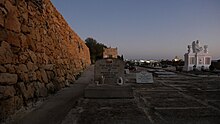Re A (conjoined twins)
| Re A (conjoined twins) | |
|---|---|
 | |
| Court | Court of Appeal of England and Wales |
| Decided | 22 September 2000 |
| Citation | [2001] 2 WLR 480, [2000] 3 FCR 577, [2000] HRLR 721, [2001] Fam Law 18, [2000] Lloyd's Rep Med 425, [2001] Fam 147, [2000] EWCA Civ 254, 9 BHRC 261, (2001) 57 BMLR 1, [2000] 4 All ER 961, [2000] Lloyds Rep Med 425, [2001] 1 FLR 1, [2001] UKHRR 1 |
| Case history | |
| Prior action | Declaration of lawfulness to proposed surgery in the High Court |
| Court membership | |
| Judges sitting | Lord Justice Ward, Lord Justice Brooke, Lord Justice Robert Walker |
| Case opinions | |
| Appeal dismissed; however reasoning of single judge disapproved, decision made on fresh basis. | |
| Keywords | |
| |
Re A[a] (conjoined twins) [2001] 2 WLR 480[1] is a Court of Appeal (England and Wales) decision on the separation of conjoined twins. The case raised legal and ethical dilemmas. It was ruled it would be permissible to sever and thus kill in a palliative, sympathetic manner the weaker twin to save the much stronger one.[2] The case was among those where it would be lawful to conduct surgery against the wishes of the parents. The parents' faith was held not to be overriding, nor general applicability of the outcome to all such cases.[clarification needed]
Facts
[edit]Rosie and Gracie Attard, who were born in Manchester on 8 August 2000, were conjoined twins who were joined at the abdomen.[3][4] During legal deliberations, they were given the public pseudonyms "Mary" and "Jodie", respectively.[5] The medical evidence showed that Gracie was the stronger sibling, sustaining the life of Rosie. Rosie had severe brain damage, very little heart function and no functioning lungs, and survived only due to a shared common artery supplied by Gracie. If surgically separated, Gracie was assessed as having a 94%-99% survival rate, but Rosie was guaranteed to die. If left conjoined, then their life expectancy was estimated to be around six months.[1]
Their parents, Rina and Michelangelo Attard of Xagħra, Gozo, Malta, had strong Roman Catholic beliefs. They did not consider abortion on learning that the twins were conjoined, and on their birth decided not to separate the girls, even if it meant both would die.[6][4]
Reasons of judgment and appeal decision
[edit]At first instance, Mr Justice Johnson was left to decide the case without any direct precedents to bind or guide him.[7] He relied primarily on Airedale NHS Trust v Bland where it was declared acceptable to remove life support. He ruled separation would not be murder but a case of "passive euthanasia" in which food and hydration would be withdrawn.[8]
The Court of Appeal agreed in outcome but rejected this analysis. The three appellate judges gave contrasting legal reasoning. Lord Justice Ward invoked the concept of self-defence suggesting that "If [Gracie] could speak she would surely protest, Stop it, [Rosie], you're killing me."[8] Lord Justice Brooke relied upon R v Dudley and Stephens and invoked necessity as a defence. Lord Justice Robert Walker focused upon the morally understandable intention of the surgeons, and the great body of profession opinion, in concluding that surgery could go ahead.[7]
Result
[edit]The 20-hour-long operation to separate the twins took place on 7 November 2000.[3][6] As expected, Gracie survived the operation and Rosie died. Rosie's remains were later buried in her hometown of Xagħra.[7][4]

In 2014, when Gracie was 14 years old, she was living a reasonably normal life, had a younger sister, and was thinking about studying to become a physician.[6] In 2020 she was described by surgeon Adrian Bianchi, who had stayed in touch with the family, as "stable, intelligent, independent" and "intent on establishing a professional career".[4]
See also
[edit]Notes
[edit]- ^ "Re" is a Latin abbreviation meaning "In the matter of". "A" refers to the twins, used instead of their names to preserve anonymity.
References
[edit]- ^ a b Re A (Children) [2000] EWCA Civ 254, [2001] 2 WLR 480, [2000] 4 All ER 961 (22 September 2000), Court of Appeal (England and Wales)
- ^ Mcallister, J. F. O. (18 September 2000). "Kill Mary to Save Jodie?". Time. Retrieved 31 July 2020.
- ^ a b "Jodie and Mary: The medical facts". BBC News. 7 December 2000. Retrieved 21 October 2015.
- ^ a b c d Calleja, Claudia (9 August 2020). "The operation that separated twins and divided the public". Times of Malta.
- ^ "Law decided fate of Mary and Jodie". The Guardian. 5 February 2002. Retrieved 6 October 2015.
- ^ a b c "Gozo's miracle twin Gracie Attard tells her story". Times of Malta. 11 October 2014. Retrieved 5 July 2017.
- ^ a b c "Siamese Twins Case Presents Serious Legal Doubts". Hcourt.gov.au. Retrieved 21 October 2015.
- ^ a b Annas, George (5 April 2001). "Conjoined Twins - The Limits of Law at the limits of Life". New England Journal of Medicine (subscription required). 344 (14): 1104–1108. doi:10.1056/NEJM200104053441419. PMID 11287982.
External links
[edit]- Text of the judgement in this case, and the refusal of leave to appeal, from BAILII.
- Court of Appeal judgment
